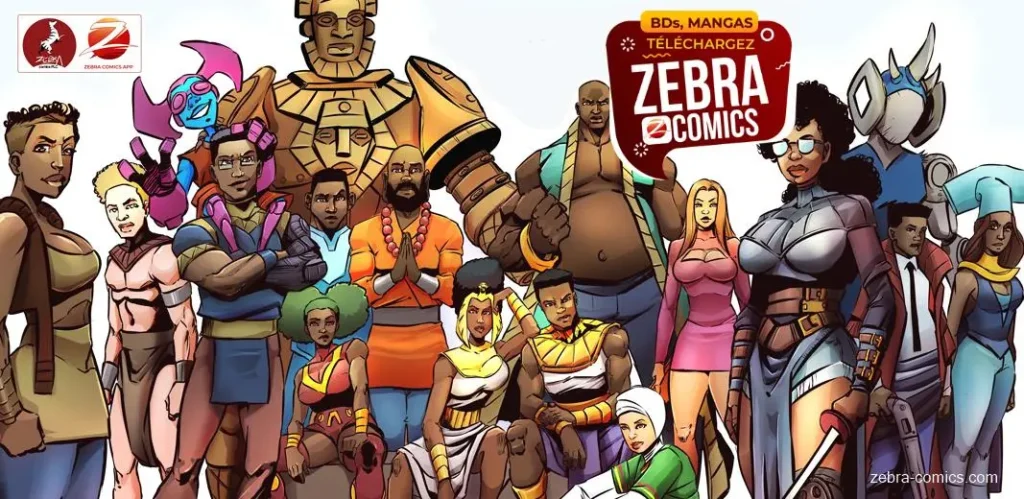“Talent is nothing without discipline and until we fix that, the industry will crawl while the world runs.”
When conversations about Africa’s comic book industry come up, most people point fingers at the usual suspects: lack of funding, poor infrastructure, or the government not doing enough. These are real issues, no doubt. But according to Ejob Nathaniel Ejob, CEO of Zebra Comics (Cameroon), the biggest obstacle holding back creators today isn’t money it’s professionalism.
“Too many ‘artists’ don’t even have a portfolio. Your last drawing was from last month, you got some ‘WOWs’ in the comments and you already think you’ve pierced. This is not value, this is illusion,” he wrote in a now-viral Facebook post that sparked heated debates among African creatives.
His words cut deep because they touch on a truth many in the industry whisper about but rarely say out loud: a culture of inconsistency, missed deadlines, and half-finished projects is slowing down the momentum of African comics.
The Discipline Gap
The global comic industry is a high-speed train. Marvel and DC churn out monthly issues like clockwork. Japan’s manga industry is fueled by an army of disciplined artists and editors who deliver week after week, rain or shine. Meanwhile, in Africa, the promise of great ideas often stalls on the drawing board.
“Freelancers, listen up: your real problem is not low pay, it’s lack of discipline. I have paid well and yet I’ve seen deadlines, excuses, and unfinished projects,” Ejob explained. “When you don’t book on time, the publisher can’t sell on time, and that delay makes everyone lose.”
It’s a vicious cycle: creators complain about poor pay, but publishers struggle to scale because projects aren’t delivered on schedule. Fans, left waiting for months (sometimes years) between issues, lose interest and move on.
The Harsh Economics of Reliability
Here’s the uncomfortable truth: reliable creators never run out of work. It’s not just about raw talent it’s about trust. Studios like Comic Republic (Nigeria), Peda Comics (Ghana), and Zebra Comics (Cameroon) survive on credibility. If a publisher knows you’ll deliver when you say you will, you become indispensable.
“The difference is simple: reliable creators generate a steady income because they finish what they start,” Ejob stressed.
That statement echoes across the industry. Ask any Nigerian studio head, and they’ll tell you stories of promising artists who flamed out after one or two viral sketches because they couldn’t meet deadlines.

Social Media vs. The Grind
Part of the problem comes from social media culture. It’s easy to mistake online clout for a career. A character sketch might rack up hundreds of likes on Instagram, but that’s not the same as finishing a 60-page graphic novel, delivering it to a publisher, and ensuring it reaches shelves or a digital platform on time.
Many Gen Z artists, fired up by validation online, leap into large projects without first developing the discipline of completing smaller ones. Ejob’s advice is painfully simple but crucial:
“Start small habits, finish small projects before taking on big ones.”
That means finishing that 6-page comic before attempting a 200-page magnum opus. It means hitting one deadline before promising four more.
Professionalism as Culture
This isn’t just a “creative problem.” It’s a cultural one. In Nollywood, despite all its flaws, filmmakers learned the hard way that deadlines matter. The music industry too an Afrobeats artist who drops a single and disappears risks being forgotten in weeks. Consistency is the oxygen of relevance.
If African comics want to compete globally to see titles from Lagos, Nairobi, or Yaoundé sitting on shelves beside Spider-Man and One Piece professionalism has to become part of the culture.
Ejob himself admits he’s been there: “I’ve been a freelancer too, I know the struggle. But successful people are those who deliver, keep their commitments, and remain consistent.”
The Future If We Don’t Fix This
Here’s the scary part: if this culture of inconsistency continues, Africa’s comic industry risks being left behind just as the world is finally opening up to African stories. Netflix is investing in African animation. Disney is experimenting with African-inspired worlds like Iwájú. Studios across the globe are scouting for fresh, authentic voices.
But opportunity has an expiration date. If African creators can’t deliver consistently, those opportunities will go elsewhere to Asia, to Latin America, to the next region hungry enough to put in the grind.
So What’s Next?
Ejob’s post struck a nerve because it’s not just a rant it’s a roadmap. The industry doesn’t need only money; it needs discipline, consistency, and professionalism. The young artist in Port Harcourt sketching after class. The freelancer in Nairobi juggling commissions. The studio in Accra planning its next series. Everyone has a role to play.
Because at the end of the day, professionalism is what will transform African comics from a promising movement into a global powerhouse.
And maybe the bigger question is: are we ready to confront this truth?
Your turn: Do you agree with Ejob? Is discipline the real problem, or is the lack of funding still the bigger monster? Share your thoughts the debate is far from over.
(Source: Facebook post by Ejob Nathaniel Ejob)